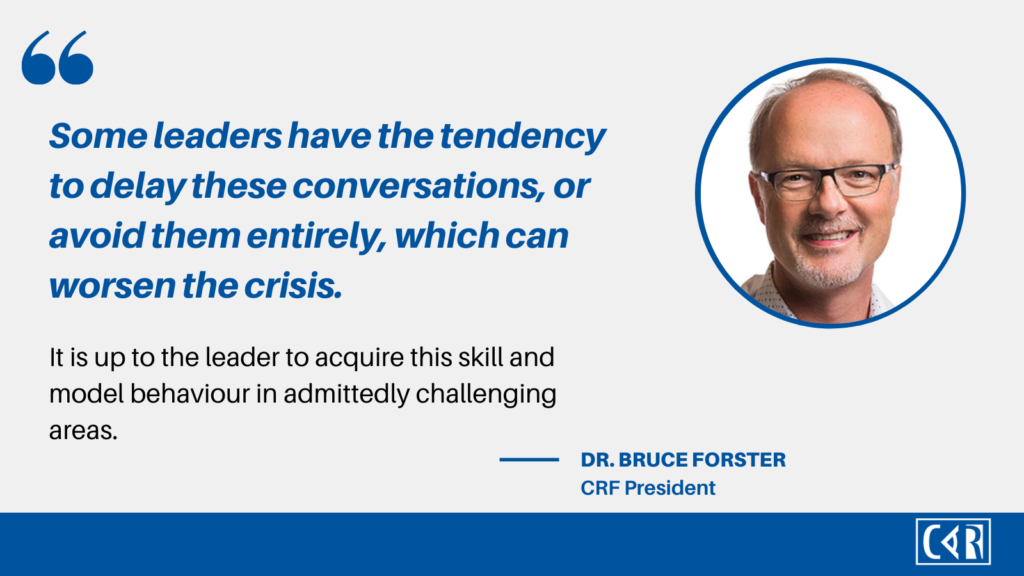Featuring Dr. Bruce Forster
Not every individual conversation in the workplace has a measurable consequence, but the most impactful changes often start with a single discussion. These conversations are difficult and uncomfortable in their moment of execution but can have lasting positive outcomes. Having spent decades as a professor while holding numerous positions in organizational leadership, including as President of the Canadian Radiological Foundation, Dr. Bruce Forster knows that the ability to navigate through difficult conversations productively is imperative for those in leadership positions.
 Dr. Forster says this an essential ability for leaders because of how commonplace difficult conversations in the workplace are. Some of these conversations are highly formalized, like a performance review, while many are less formal, like responding to criticism or delivering bad news.
Dr. Forster says this an essential ability for leaders because of how commonplace difficult conversations in the workplace are. Some of these conversations are highly formalized, like a performance review, while many are less formal, like responding to criticism or delivering bad news.
For many leaders, this is not a behaviour that comes naturally or comfortably. “Some leaders have the tendency to delay these conversations, or avoid them entirely, which can worsen the crisis,” says Forster. “However, this can have a major impact on the health and performance of any unit, so it is up to the leader to acquire this skill and model behaviour in admittedly challenging areas.” The good news is there are plenty of resources to help. The canonical book on the topic Difficult Conversations has worked for Dr. Forster, but he says there is only so much that can be learned from reading. “Speak to your local leaders to get their advice. Live and on-line courses are available from CMPA, CMA Joule, ACR, and RSNA. Even better, inquire in your community about mentors and coaches.”
Forster notes there are several key things for leaders to know when having difficult conversations.
- Come to the conversation prepared – gather data from both sides of an issue and review your goals but be flexible to better understand the issues at hand.
- Give bad news up front and actively listen throughout the discussion.
- Brace yourself for negative reactions – they are often a natural response during difficult conversations, but it is important to maintain composure and be aware that your buttons may be pushed.
- Be solution oriented even if it is necessary to ‘agree to disagree.’
Regardless of the situation, Forster says “follow-up is very important as some individuals have a delayed reaction to such difficult conversations, and support may be needed.”
Just as important as following these best practice steps is to know and avoid common mistakes. The most critical, least productive, and all-too common mistake is avoiding the conversation completely. Becoming overly combative is an easy mistake to make in an emotionally charged discussion, but Forster points out that it is important to remember to maintain respect for your colleagues and keep a neutral tone. Becoming anchored to your own solution is detrimental to resolving a given conflict and it is important to allow your colleague the chance to provide their perspective.
Staying in leadership long enough will invariably create situations that can only be addressed and resolved with a difficult conversation. Forster says these moments, though hard and uncomfortable, are crucial for a leader’s growth, and has endured indelible moments that have benefitted his own career.
“In 2011 in BC, there was a very well publicized quality breach in CT interpretation in a local community for which I was the recently appointed Regional Department Head. The Health Authority CEO, the Vice-President of Medicine, and myself traveled to the rural community to address some citizens in a local gymnasium who were appropriately very upset. We actively listened to their concerns for over an hour, and then outlined a response: we were not going to ‘study’ the issue, but in fact had already drafted safeguards, which we would modify based on community input, so that what had occurred would never happen again. It was without doubt the most compelling and rewarding two hours of my professional life.”
With his wealth of knowledge and experience, the CAR is honored to have involved Dr. Forster in our own organizational leadership at various times throughout his career.
